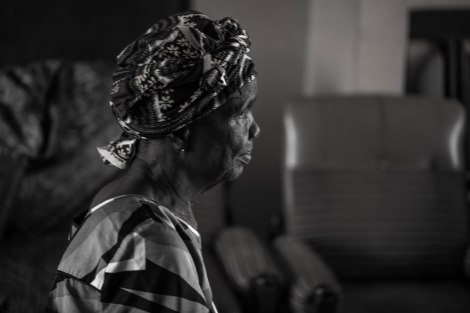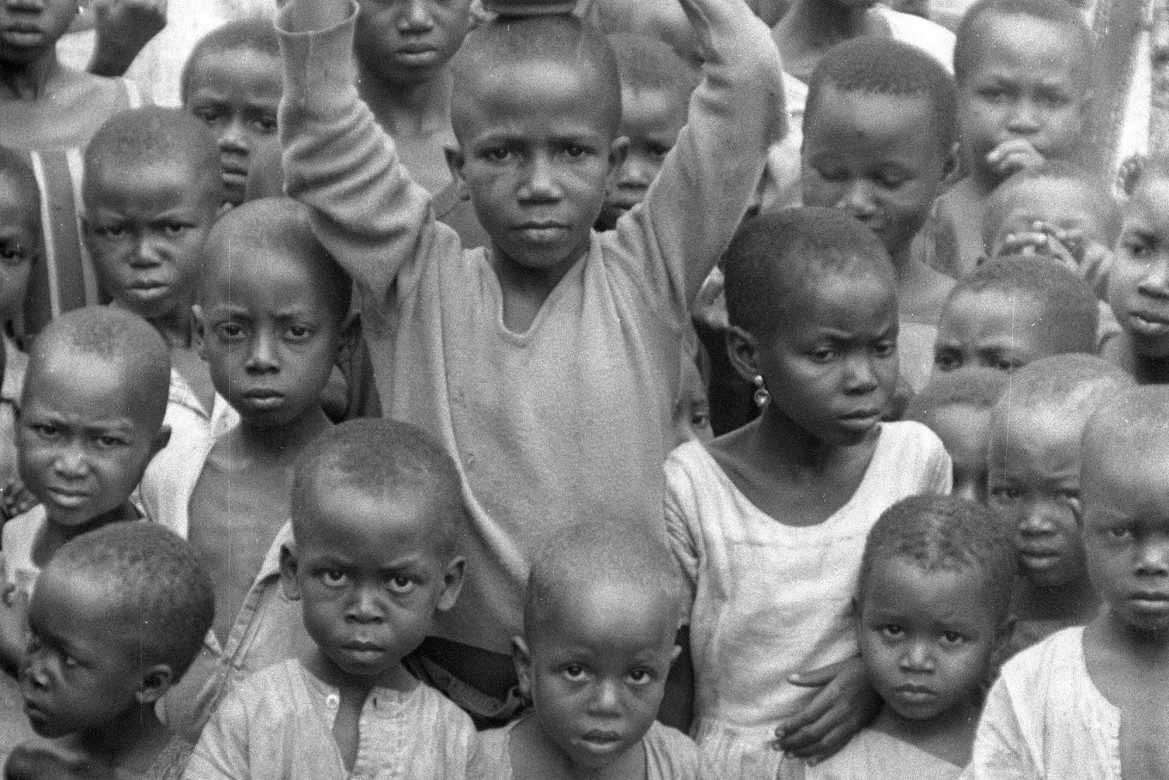My name is Mrs. Alexinia Oforchebe. [I was born in] 1939 in this Awkuzu [a town in Anambra State, Nigeria].

Alexinia Oforchebe shares her Nigerian-Biafran War memories. Photo by Chika Oduah
I was married then [when the war started]. I had given birth to children. They are up to three children. My husband was working, doing white man’s job [likely as a civil servant.]
I was in Awkuzu, no, Enugu [when the war started]. I was into market [trade]. I was selling provisions in a store.
How I knew that the war had started that time was that people started running. At that time, all those in Lagos and those in different places started coming back [including some of my relatives], only that they are not alive again [anymore].
Some of them were living in Enugu while some were living in Lagos. [None were living in the North.] When they came back, everybody became [appeared] slim.
When the war started, everybody was in their place. Later on, the Hausas came in. We used to be afraid that they were going to kill us.
They had destroyed our house
The fighting started in Enugu and we came back to Awkuzu from Enugu. Everybody went to his own village [with cars]. But my husband take foot [walked] from Enugu to Awkuzu. We didn’t carry anything. We were only carrying our clothes.
[We paid a vehicle to take us to Awkuzu]. I don’t remember how much but I paid with Nigerian money.] We came back to Awkuzu and war started [eventually came to] in Awkuzu so we left Awkuzu one evening.
People [in Akwuzu] started fighting and the Hausas started killing people. Everybody [in Akwuzu] started running.
…bullets? They were always sounding gbam gbam gbam.
Me and my children ran. They had destroyed our house and that of other people and everybody in Awkuzu was running. Where we ran to was Nkwelle Ezunaka [ a town in Anambra State, Nigeria].

Alexinia Oforchebe. Photo by Chika Oduah. 2019
We used our legs.
[My children never became sick during the war.] My mother was cultivating in the farm and so, she was supplying us food.
There were some white people that were bringing food for us. It was [Chukwuemeka] Ojukwu that made the arrangement, even rice.
[We stayed in Nkwelle Ezunaka until the war ended.]
…everybody begins to shiver
Whenever they start shooting we enter inside the bush and hide. There was something they were calling bunker that we used to cover ourselves. It was we who came to the place that built the bunker ourselves.
We were running for our lives when the airplane was flying in the air and throwing bombs. It was not hot. It was cool [inside the bunker].
Anytime that shelling or bomb is thrown, everybody begins to shiver.
My children were all small then….we were carrying them with our hands and some of them, we were carrying on our backs.
We suffered. We were doing farm work. We were grinding garri [a granular product produced from fermented cassava].
[There were plenty of times there was shelling in the market]. Because of everything that was happening, we were thinking [we may not survive].
We use to run inside the bunker each time they threw bombs.

Alexinia Oforchebe ‘s hands. Photo by Chika Oduah
We had someone who joined the [Biafran] army that time. He was my husband’s brother. But he did not come back again.
We were crying and asking when the war will finish. Many people died. We saw many people. Some of them [the dead bodies I saw] were members of the army who were shot. We use to follow another road [where we wouldn’t encounter corpses].
There was no church [service] then [so we were not attending church].
We were not together with my husband then. He [was initially with us in Nwelle Ezunaka but then] later went to a place they call Biafra One [around Nnewi, a city in Anambra State]. There was somebody that called him and he was supplying the Biafran Army with oil they use to drive their car. It was Biafran money that he was using. [We don’t have anymore Biafran money]. We thew it all away.
I sold my clothes. I sold gold in Nnewi market [to buy food so me and my children could survive.] I wasn’t sad about it because I used what I had to save myself.
In Nkwelle Ezunaka I slept in a thatched roof house with my children. [My husband didn’t build it. It was in the community.]
It was because of the things I sold that I got money with which I was feeding my children [so we never suffered from kwashiokor].
…when we got home, there was nothing

Alexinia Oforchebe. Photo by Chika Oduah
How I knew that the war had ended was that I came out of Nkwelle Ezunaka to buy something one day and then I saw Hausa army and they said that the war had ended and that we should not run again [anymore]. We started gathering our property and looking for a big car that will carry us home and when we got home, there was nothing. Everything had been destroyed. Everybody started coming home. We [my parents and I] were in the same place and after the war.
What I remember is that during the war, the Hausa army [soldiers] took many of our young girls from Biafra and went to their place [the North].
[The Nigerian soldiers never came to Nkwelle Ezunaka].
I was supporting them [Biafra during the war]. I did not have any option.
[Singing a Biafran propaganda song that she remembers]
Ebe ka unu si? Biafra [Where are you from? Biafra]
Ebe ka unu si? Biafra [Where are you from? Biafra]
Aghagim arapu Biafra, je na ebeozo bili [I will not leave Biafra and go elsewhere to live]
Aghagim arapu Biafra, je na ebeozo bili [I will not leave Biafra and go elsewhere to live]
Biafra ga adindu [Biafra will live]
Alexinia Oforchebe granted this interview to Chika Oduah from her home in Anambra State, Nigeria.
